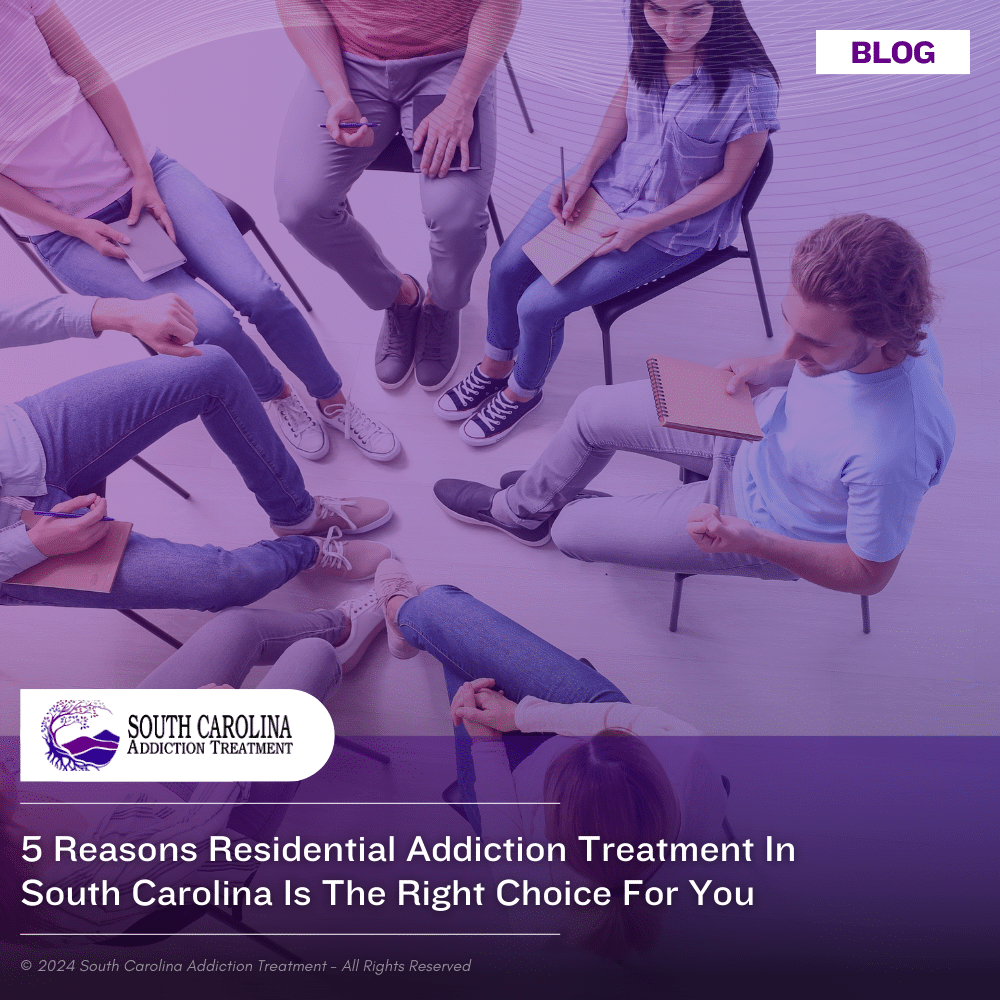5 Reasons Residential Addiction Treatment in South Carolina is the Right Choice for You

Medically Verified: 2/1/24
Medical Reviewer
Chief Editor

All of the information on this page has been reviewed and verified by a certified addiction professional.
Addiction is a severe problem in the United States, and when someone struggles with addiction, they must receive professional care to learn how to maintain long-term sobriety. Unfortunately, while 10% of U.S. adults suffer from a drug use disorder, 75% never receive the help they need.[1]
If you or a loved one suffers from an addiction, you have probably considered attending drug and alcohol rehab. There are many different types of treatment centers, but most of them can be broken into two categories: residential and outpatient programs. While outpatient programs can provide you with a flexible schedule to continue working during treatment, residential treatment centers will offer you the most intensive care.
Here are 5 reasons that residential addiction treatment in South Carolina is right for you.
1. Individualized Treatment Planning
The first benefit of residential addiction treatment in South Carolina is that you’ll receive individually-tailored treatment services customized to your needs.
When you enter an inpatient program you will undergo an in-depth assessment. This assessment will gather information about your physical and mental health as well as your history of substance abuse. As a result, the medical team can create a treatment plan that is tailored to your specific needs and goals for recovery.
2. 24/7 Monitoring and Support
Another reason you should consider attending a residential rehab program is because of the 24/7 monitoring and support these facilities offer. When you enroll in one of these programs, you will be expected to live at the facility during the treatment process. The program will provide you with constant access to medical treatment, mental health services, and addiction recovery support.
Having constant access to this type of support can keep you accountable, provide you with the tools you need to remain focused in your recovery and help you overcome the challenges of early sobriety. In other words, residential treatment can decrease your chances of relapse and makes you more likely to experience long-term recovery from addiction.
3. Evidence-Based Behavioral Therapy
One of the most important reasons you should choose a residential rehab in South Carolina is because they offer evidence-based behavioral therapy. This means that the therapy you participate in is proven to be effective in helping you recover from addiction. These therapies are usually used to unpack the root causes of your addiction, teach you how to manage triggers, and help you self-regulate your emotions.
Examples of evidence-based behavioral therapies used include:
- Cognitive behavioral therapy (CBT)
- Motivational interviewing (MI)
- Contingency management (CM)
- The matrix model
- 12-step facilitation therapy
- Family behavior therapy
4. Treatment for Co-Occurring Mental Health Conditions
According to the Substance Abuse and Mental Health Services Administration (SAMHSA), “approximately 9.2 million adults in the United States have a co-occurring disorder.”[2] Having a co-occurring mental health condition and substance use disorder can be difficult. However, receiving dual diagnosis treatment in a residential setting can allow you to learn how to manage your mental health symptoms and maintain long-term sobriety at the same time. Residential treatment programs are typically more well-suited to address co-occurring issues.
If you struggle with one of the following conditions alongside your substance use disorder, you should consider attending an inpatient rehab program in South Carolina:
- Anxiety conditions like social anxiety or obsessive-compulsive disorder (OCD)
- Post-traumatic stress disorder (PTSD)
- Bipolar disorder
- Depressive disorders like major depressive disorder (MDD)
- Personality disorders like borderline personality disorder (BPD)
- Psychotic disorders like schizophrenia
5. Emphasis on Aftercare Planning
According to the National Institute of Drug Abuse (NIDA), the addiction relapse rate is between 40 to 60%.[3] This means that about half of the people who achieve sobriety also experience a relapse at some point in their recovery. As a result, it is important to receive treatment that prioritizes providing you with the tools you need to prevent relapses from occurring.
When you choose a residential addiction treatment program in South Carolina, you can rest assured that you will receive extensive aftercare planning.
Examples of services and tools included in an aftercare plan include:
- Continued attendance at therapy
- Continued medication management if needed
- Access to alumni support groups
- Vocational training
- A list of triggers and coping mechanisms to use
- Sober supports to call in times of need
- Referrals to sober living housing programs
- Recommendations on addiction support groups to attend like Alcoholics Anonymous (AA)
Find Residential Addiction Treatment in South Carolina Today
If you or a loved one require addiction treatment, you’ve come to the right place. At South Carolina Addiction Treatment Center, we can provide you with the highest level of care possible to help you establish a foundation in recovery. From 24/7 monitoring and support to aftercare planning, we can offer you all of the tools and services you need to achieve lifelong recovery.
To learn more about our residential substance abuse treatment program, contact South Carolina Addiction Treatment Center today.
References:
- National Institutes of Health (NIH): 10 percent of US adults have drug use disorder at some point in their lives, Retrieved May 2023 From https://www.nih.gov/news-events/news-releases/10-percent-us-adults-have-drug-use-disorder-some-point-their-lives
- Substance Abuse and Mental Health Services Administration (SAMSHA): Co-Occurring Disorders and Other Health Conditions, Retrieved May 2023 From https://www.samhsa.gov/medications-substance-use-disorders/medications-counseling-related-conditions/co-occurring-disorders
- National Institute on Drug Abuse (NIDA): The Science of Addiction Treatment and Recovery, Retrieved May 2023 From https://nida.nih.gov/publications/drugs-brains-behavior-science-addiction/treatment-recovery

